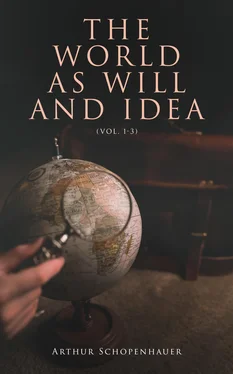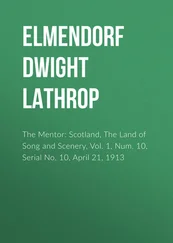The identity of the will and the body, of which we have now given a cursory explanation, can only be proved in the manner we have adopted here. We have proved this identity for the first time, and shall do so more and more fully in the course of this work. By “proved” we mean raised from the immediate consciousness, from knowledge in the concrete to abstract knowledge of the reason, or carried over into abstract knowledge. On the other hand, from its very nature it can never be demonstrated, that is, deduced as indirect knowledge from some other more direct knowledge, just because it is itself the most direct knowledge; and if we do not apprehend it and stick to it as such, we shall expect in vain to receive it again in some indirect way as derivative knowledge. It is knowledge of quite a special kind, whose truth cannot therefore properly be brought under any of the four rubrics under which I have classified all truth in the essay on the principle of sufficient reason, § 29, the logical, the empirical, the metaphysical, and the metalogical, for it is not, like all these, the relation of an abstract idea to another idea, or to the necessary form of perceptive or of abstract ideation, but it is the relation of a judgment to the connection which an idea of perception, the body, has to that which is not an idea at all, but something toto genere different, will. I should like therefore to distinguish this from all other truth, and call it κατ᾽ εξοχην philosophical truth . We can turn the expression of this truth in different ways and say: My body and my will are one;—or, What as an idea of perception I call my body, I call my will, so far as I am conscious of it in an entirely different way which cannot be compared to any other;—or, My body is the objectivity of my will;—or, My body considered apart from the fact that it is my idea is still my will, and so forth.27
§ 19. In the first book we were reluctantly driven to explain the human body as merely idea of the subject which knows it, like all the other objects of this world of perception. But it has now become clear that what enables us consciously to distinguish our own body from all other objects which in other respects are precisely the same, is that our body appears in consciousness in quite another way toto genere different from idea, and this we denote by the word will ; and that it is just this double knowledge which we have of our own body that affords us information about it, about its action and movement following on motives, and also about what it experiences by means of external impressions; in a word, about what it is, not as idea, but as more than idea; that is to say, what it is in itself . None of this information have we got directly with regard to the nature, action, and experience of other real objects.
It is just because of this special relation to one body that the knowing subject is an individual. For regarded apart from this relation, his body is for him only an idea like all other ideas. But the relation through which the knowing subject is an individual , is just on that account a relation which subsists only between him and one particular idea of all those which he has. Therefore he is conscious of this one idea, not merely as an idea, but in quite a different way as a will. If, however, he abstracts from that special relation, from that twofold and completely heterogeneous knowledge of what is one and the same, then that one , the body, is an idea like all other ideas. Therefore, in order to understand the matter, the individual who knows must either assume that what distinguishes that one idea from others is merely the fact that his knowledge stands in this double relation to it alone; that insight in two ways at the same time is open to him only in the case of this one object of perception, and that this is to be explained not by the difference of this object from all others, but only by the difference between the relation of his knowledge to this one object, and its relation to all other objects. Or else he must assume that this object is essentially different from all others; that it alone of all objects is at once both will and idea, while the rest are only ideas, i.e., only phantoms. Thus he must assume that his body is the only real individual in the world, i.e., the only phenomenon of will and the only immediate object of the subject. That other objects, considered merely as ideas , are like his body, that is, like it, fill space (which itself can only be present as idea), and also, like it, are causally active in space, is indeed demonstrably certain from the law of causality which is a priori valid for ideas, and which admits of no effect without a cause; but apart from the fact that we can only reason from an effect to a cause generally, and not to a similar cause, we are still in the sphere of mere ideas, in which alone the law of causality is valid, and beyond which it can never take us. But whether the objects known to the individual only as ideas are yet, like his own body, manifestations of a will, is, as was said in the First Book, the proper meaning of the question as to the reality of the external world. To deny this is theoretical egoism , which on that account regards all phenomena that are outside its own will as phantoms, just as in a practical reference exactly the same thing is done by practical egoism. For in it a man regards and treats himself alone as a person, and all other persons as mere phantoms. Theoretical egoism can never be demonstrably refuted, yet in philosophy it has never been used otherwise than as a sceptical sophism, i.e., a pretence. As a serious conviction, on the other hand, it could only be found in a madhouse, and as such it stands in need of a cure rather than a refutation. We do not therefore combat it any further in this regard, but treat it as merely the last stronghold of scepticism, which is always polemical. Thus our knowledge, which is always bound to individuality and is limited by this circumstance, brings with it the necessity that each of us can only be one , while, on the other hand, each of us can know all ; and it is this limitation that creates the need for philosophy. We therefore who, for this very reason, are striving to extend the limits of our knowledge through philosophy, will treat this sceptical argument of theoretical egoism which meets us, as an army would treat a small frontier fortress. The fortress cannot indeed be taken, but the garrison can never sally forth from it, and therefore we pass it by without danger, and are not afraid to have it in our rear.
The double knowledge which each of us has of the nature and activity of his own body, and which is given in two completely different ways, has now been clearly brought out. We shall accordingly make further use of it as a key to the nature of every phenomenon in nature, and shall judge of all objects which are not our own bodies, and are consequently not given to our consciousness in a double way but only as ideas, according to the analogy of our own bodies, and shall therefore assume that as in one aspect they are idea, just like our bodies, and in this respect are analogous to them, so in another aspect, what remains of objects when we set aside their existence as idea of the subject, must in its inner nature be the same as that in us which we call will . For what other kind of existence or reality should we attribute to the rest of the material world? Whence should we take the elements out of which we construct such a world? Besides will and idea nothing is known to us or thinkable. If we wish to attribute the greatest known reality to the material world which exists immediately only in our idea, we give it the reality which our own body has for each of us; for that is the most real thing for every one. But if we now analyse the reality of this body and its actions, beyond the fact that it is idea, we find nothing in it except the will; with this its reality is exhausted. Therefore we can nowhere find another kind of reality which we can attribute to the material world. Thus if we hold that the material world is something more than merely our idea, we must say that besides being idea, that is, in itself and according to its inmost nature, it is that which we find immediately in ourselves as will . I say according to its inmost nature; but we must first come to know more accurately this real nature of the will, in order that we may be able to distinguish from it what does not belong to itself, but to its manifestation, which has many grades. Such, for example, is the circumstance of its being accompanied by knowledge, and the determination by motives which is conditioned by this knowledge. As we shall see farther on, this does not belong to the real nature of will, but merely to its distinct manifestation as an animal or a human being. If, therefore, I say—the force which attracts a stone to the earth is according to its nature, in itself, and apart from all idea, will, I shall not be supposed to express in this proposition the insane opinion that the stone moves itself in accordance with a known motive, merely because this is the way in which will appears in man.28 We shall now proceed more clearly and in detail to prove, establish, and develop to its full extent what as yet has only been provisionally and generally explained.29
Читать дальше












